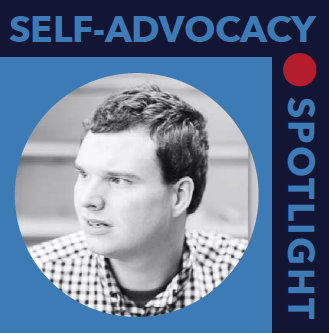SELF-ADVOCACY SPOTLIGHT - Exercise Your Voting Rights
John McCarty, consultant and member of the Uniting for Change Leadership Collective, talks about what voting means to him as a citizen and self-advocate.
 I’ve always been interested in news. The news about how the government operates and what the government is doing has always fascinated me. I listen to NPR, and I read articles from several newspapers, including the Atlanta Journal-Constitution, the New York Times and the Washington Post. I also listen to my family talking about current events.
I’ve always been interested in news. The news about how the government operates and what the government is doing has always fascinated me. I listen to NPR, and I read articles from several newspapers, including the Atlanta Journal-Constitution, the New York Times and the Washington Post. I also listen to my family talking about current events.
After I turned 18, I was interested in voting, but I was under guardianship. My family was unsure if guardianship precluded my voting, and we could not find a clear statement in my guardianship ruling. We did some research and found that, in Georgia, if the guardianship order does not specifically say that voting is not allowed, a person under guardianship has the right to vote.
I registered as a voter online using my Georgia ID number. Now came the critical part. How would I vote? Specifically, I wasn’t worried about for whom I would vote, but whether I would do it in person or by mail. Since I need physical support, I knew I could request a mail-in ballot.
For the past four years, I have voted in every election, including run-offs. Mostly I have used an absentee, or mail-in, ballot. Once, when a requested ballot did not come in the mail, I went to the polling place and signed an affidavit saying that I never got the absentee ballot.
When the full ballot comes in the mail, now is the fun part: the research. I learn as much as possible about each of the candidates. My sources of information include the Atlanta Journal-Constitution, the League of Women Voters, Ballotpedia, candidate websites and the North Fulton Neighbor (my local weekly town newspaper). When I have questions not answered in any of those places, I email candidates.
When I spend time thinking about what is important in my life, disability issues rank right up there; that is often the topic of my emails. Some candidates never respond. Some give complete and detailed answers. My vote is guided by both non-answers and detailed ones.
I once asked a candidate, “Where do you stand on disability issues?” His response was, “What issues?” Needless to say, he didn’t get my vote.
I will continue to vote in every election. I am proud to exercise my right as a citizen of the United States of America.
by John McClarty
Uniting for Change is a grassroots network of self-advocates that is growing the self-advocacy movement in Georgia. Along with family members, allies and supporters, self-advocates work on “uniting Georgians and influencing change by speaking up and taking control of our lives.”
DID YOU KNOW? Supported Decision-Making is an alternative to guardianship that allows people with intellectual and developmental disabilities to preserve their rights, like the right to vote. Author John McCarty serves on the Supported Decision-Making Advisory Council at the Georgia Advocacy Office.
www.uniting4change.org
www.facebook.com/unitingforchangeGeorgia
www.instagram.com/uniting4changegeorgia
